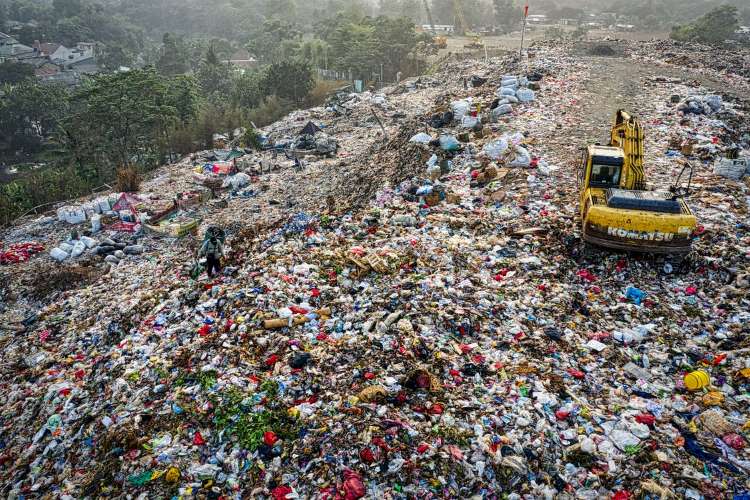Plastic pollution threat: As plastic becomes synonymous with convenience, its pervasiveness poses a dire threat to the planet. The scale of the problem is monumental: since 1950, humanity has produced about 11 billion metric tonnes of virgin plastic, much of which now exists as environmental waste. This staggering figure highlights the urgency of the situation, with projections suggesting a 60% increase in global plastic waste by 2050. Such a future would not only mar the landscapes, but also endanger countless ecosystems and the very fabric of human health.
Microplastics, tiny fragments less than 5 millimetres in size, have been found in our food, water, and even air. Research suggests they can accumulate in human organs, potentially leading to a range of health problems, including cancer, endocrine disruption, and developmental issues. A recent study published in the journal Environment International found microplastics in the placentas of unborn babies, raising concerns about potential harm to foetal development. The World Health Organisation is currently conducting a comprehensive assessment of the health risks associated with microplastic exposure, highlighting the urgency of addressing plastic pollution at the global level.
Yet, amid this bleak outlook, there emerges a ray of hope. The collective decision of over 175 countries to develop a legally binding international treaty to end plastic pollution by 2040 is a landmark step. This agreement, echoing the spirit of global unity, reflects a growing recognition of the need for concerted action against the scourge of plastic pollution.
READ I COP28 shows glimmer of hope, but green tech innovation needs a boost
Strategies to end plastic pollution
To transition to a sustainable future, a combination of innovative and rigorous policies is required. Key among these is the introduction of recycled content mandates. The proposal to require all new plastic products to contain at least 30% recycled material is a game-changer. Such a mandate could significantly reduce mismanaged plastic waste, potentially cutting it down by about 30% by 2050.
Capping plastic production is another critical measure. Holding production levels to those of 2025 could further diminish plastic waste, taking us closer to a more manageable and sustainable scenario. This strategy recognises the need to balance economic realities with environmental imperatives.
Implementing a high consumer tax on plastics also emerges as a potent tool. Not only would it discourage excessive use of plastics, but the revenue generated could be strategically reinvested into global waste management infrastructure. This approach represents a holistic way of tackling the problem, where financial tools are leveraged for environmental benefit.
While the banning of specific single-use plastics might not be the most impactful measure, it still holds considerable significance. The prohibition of items like plastic bags, straws, and polystyrene packaging can substantially reduce the amount of plastic entering our rivers and oceans. These bans, although seemingly small steps, contribute to a larger cultural shift towards sustainable consumption.
Despite the challenges, innovative solutions are emerging to combat plastic pollution. In Kenya, the startup Polyeco transforms plastic waste into durable building materials, providing affordable housing solutions and diverting plastic from landfills. In Chile, a nationwide ban on single-use plastic bags has led to a dramatic reduction in plastic waste, demonstrating the effectiveness of policy interventions. These success stories offer hope and inspiration, proving that transitioning to a plastic-free future is not only necessary but also achievable.
Industry influence and political inertia
The journey towards a plastic-free world is not without its challenges. Recent developments in international negotiations have revealed the significant influence of the oil and gas industry, with some oil-producing countries advocating for less stringent measures. This resistance from a sector deeply intertwined with plastic production highlights the complexities of achieving consensus on a global scale.
The role of the United States in this scenario cannot be overstated. As the largest producer of plastic waste, it bears a unique responsibility to lead by example. The nation’s ability to navigate legal complexities and counter the powerful fossil fuel industry will be pivotal in shaping the global response to plastic pollution.
The moral imperative to act
The threat posed by plastic waste transcends environmental concerns; it is a matter of public health, social justice, and ethical responsibility. The presence of microplastics in human tissues has brought the issue into our very bodies, making it a deeply personal crisis. Furthermore, the disproportionate impact of plastic pollution on marginalised communities, particularly those reliant on waste picking, adds a layer of social injustice to the problem.
As the world prepares for further negotiations, there is a need for unwavering commitment and bold action. The treaty’s success hinges on the prioritisation of impactful policies, the confrontation of industrial lobbying, and a shared understanding of the gravity of the situation.
The path to a plastic-free future is indeed challenging, but it is also filled with opportunity. It is a chance to redefine our relationship with materials, to innovate in the realm of sustainable production, and to forge a future where the health of our planet and its inhabitants is the paramount consideration.
The plastic crisis is a testament to the unintended consequences of human innovation. Yet, it also presents us with an opportunity to demonstrate our capacity for resilience, ingenuity, and collective action. The steps we take today will determine the legacy we leave for future generations. Let us choose a path that leads to a cleaner, healthier, and more equitable world.

